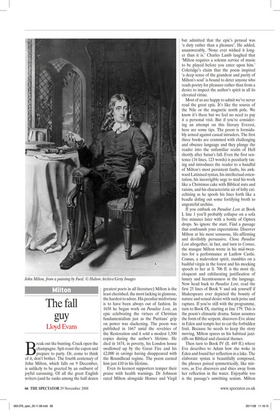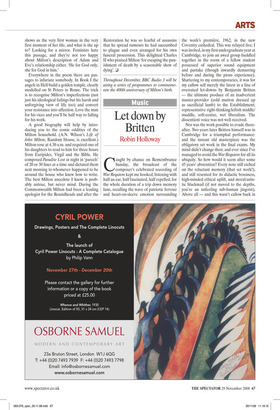The fall guy
Lloyd Evans
Break out the bunting. Crack open the champagne. Spit-roast the capon and prepare to party. Or, come to think of it, don’t bother. The fourth centenary of John Milton, which falls on 9 December, is unlikely to be greeted by an outburst of joyful carousing. Of all the great English writers (and he ranks among the half dozen greatest poets in all literature) Milton is the least cherished, the most lacking in glamour, the hardest to adore. His peculiar misfortune is to have been always out of fashion. In 1658 he began work on Paradise Lost, an epic celebrating the virtues of Christian fundamentalism just as the Puritans’ grip on power was slackening. The poem was published in 1667 amid the revelries of the Restoration and it sold a modest 1,500 copies during the author’s lifetime. He died in 1674, in poverty, his London house swallowed up by the Great Fire and his £2,000 in savings having disappeared with the Roundhead regime. The poem earned him just £10 in his lifetime.
Even its keenest supporters temper their praise with health warnings. Dr Johnson rated Milton alongside Homer and Virgil but admitted that the epic’s perusal was ‘a duty rather than a pleasure’. He added, unanswerably, ‘None ever wished it longer than it is.’ Charles Lamb laughed that ‘Milton requires a solemn service of music to be played before you enter upon him.’ Coleridge’s claim that the poem inspired ‘a deep sense of the grandeur and purity of Milton’s soul’ is bound to deter anyone who reads poetry for pleasure rather than from a desire to inspect the author’s spirit in all its elevated virtue.
Most of us are happy to admit we’ve never read the great epic. It’s like the source of the Nile or the magnetic north pole. We know it’s there but we feel no need to pay it a personal visit. But if you’re considering an attempt on this literary Everest, here are some tips. The poem is formidably armed against casual intruders. The first three books are crammed with challenging and obscure language and they plunge the reader into the unfamiliar realm of Hell shortly after Satan’s fall. Even the first sentence (16 lines, 123 words) is peculiarly taxing and introduces the reader to a handful of Milton’s most persistent faults, his awkward Latinised syntax, his intellectual ostentation, his incorrigible urge to stud his work like a Christmas cake with Biblical nuts and raisins, and his characteristic air of lofty catechising as he spools his lines forth like a beadle doling out some fortifying broth to ungrateful urchins.
If you embark on Paradise Lost at Book I, line 1 you’ll probably collapse on a sofa five minutes later with a bottle of Optrex drops. So ignore the start. Find a passage that confounds your expectations. Discover Milton at his most sensuous, life-affirming and devilishly persuasive. Close Paradise Lost altogether, in fact, and turn to Comus, the masque Milton wrote in his mid-twenties for a performance at Ludlow Castle. Comus, a malevolent spirit, stumbles on a bashful virgin in the forest and his mocking speech to her at ll. 706 ff. is the most sly, eloquent and exhilarating justification of luxury and licentiousness in the language. Now head back to Paradise Lost, read the first 25 lines of Book V and ask yourself if Shakespeare ever depicted the bounty of nature and sexual desire with such poise and rapture. If you’re still with the programme, turn to Book IX, starting at line 179. This is the poem’s climactic drama. Satan assumes the form of the serpent, discovers Eve alone in Eden and tempts her to eat the forbidden fruit. Because he needs to keep the story moving, Milton spares us his habitual jazzriffs on Biblical and classical themes.
Then turn to Book IV (ll. 449 ff.) where Eve describes to Adam how she woke in Eden and found her reflection in a lake. The elaborate syntax is beautifully composed, the phrases poised symmetrically, like mirrors, as Eve discovers and shies away from her reflection in the water. Enjoyable too is the passage’s unwitting sexism. Milton shows us the very first woman in the very first moment of her life, and what is she up to? Looking for a mirror. Feminists hate this passage, and they’re not too happy about Milton’s description of Adam and Eve’s relationship either. ‘He for God only, she for God in him.’ Everywhere in the poem there are passages to infuriate somebody. In Book I the angels in Hell build a golden temple, clearly modelled on St Peters in Rome. The trick is to recognise Milton’s imperfections (not just his ideological failings but his harsh and unforgiving view of life too) and convert your resistance into affection. Love the man for his vices and you’ll be half way to falling for his work.
A good biography will help by introducing you to the comic oddities of the Milton household. (A.N. Wilson’s Life of John Milton, Random House, is excellent.) Milton rose at 4.30 a.m. and required one of his daughters to read to him for three hours from Euripides, Virgil and the Bible. He composed Paradise Lost at night in ‘parcels’ of 20 or 30 lines at a time and dictated them next morning to whomever happened to be around the house who knew how to write. The best Milton anecdote I know is probably untrue, but never mind. During the Commonwealth Milton had been a leading apologist for the Roundheads and after the Restoration he was so fearful of assassins that he spread rumours he had succumbed to plague and even arranged for his own funeral procession. This delighted Charles II who praised Milton ‘for escaping the punishment of death by a seasonable show of dying’. ❑ Throughout December, BBC Radio 3 will be airing a series of programmes to commemorate the 400th anniversary of Milton’s birth.



































































































 Previous page
Previous page